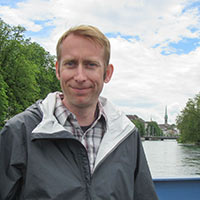 There are wide frontiers for integrating social science into water resources management. In this interview, we feature Dr. Jason Duvall, Lecturerand Post-Doctoral Researcher in environmental psychology at the University of Michigan. Dr. Duvall is the co-principal investigator of the project Stuck in the Muck: Comparing how experts and local communities see beach muck in the Great Lakes supported by the Water Center.
There are wide frontiers for integrating social science into water resources management. In this interview, we feature Dr. Jason Duvall, Lecturerand Post-Doctoral Researcher in environmental psychology at the University of Michigan. Dr. Duvall is the co-principal investigator of the project Stuck in the Muck: Comparing how experts and local communities see beach muck in the Great Lakes supported by the Water Center.
Q: In a few sentences, briefly describe your area(s) of expertise and current water research.
A: As an environmental psychologist, my main interest is on understanding how people relate to and make sense of the environment and environmental problems. With respect to water, this focus has led my colleagues and me to study how the perceptions of citizens and natural resource experts differ around contentious freshwater management issues within the Great Lakes region. The main goal of this work is to help foster mutual understanding between various stakeholders and lay the groundwork for future consensus building. I’ve also been involved in research investigating different ways to “localize” the issue of climate change within the Great Lakes by emphasizing water related impacts, such as flooding and algal blooms.
Q: How have you engaged end users in your water research and how has this improved your work?
A: Since my work involves exploring people’s attitudes and perceptions, engaging and working with end users is absolutely essential at every stage of the research process. Sitting down to discuss issues with stakeholders early on is about much more than just collecting data, it’s also critical for building relationships that ensure results and recommendations with resonate more strongly. We have also made efforts to share preliminary results at stakeholder meetings and invite feedback well before the final report is written. In the end, we’re always thinking about how we can make our research a collaborative process where stakeholders take a more active role in contributing insights and influencing the overall direction of the project.
Q: What challenges and opportunities have you encountered in water research and how have you approached them?
A: Some of the projects I’ve been involved in have dealt with fairly contentious freshwater management issues.Wading into these charged situations as an outside researcher can be quite challenging.People can have strong feelings about what should be done and some stakeholders can be suspicious of “academic researchers.” In these situations it’s important to remember that listening to end users and respecting their perspectives is an important first step.It's also helpful to remember that it takes time for people to consider different perspectives and come to new understandings.Getting stakeholders to help us make sense of results and be more actively involved in problem-solving is one way that we try to break down these barriers.
Q: What do you see as the future of water research—both in your area(s) of expertise and beyond?
A: There is enormous potential to integrate more social sciences perspectives into water research moving forward.Many of the most serious stressors on water systems are either directly or indirectly the result of human behaviors.This raises questions about how we can use various approaches within the social sciences to influence individuals, institutions, and society at large to protect and preserve water resources.